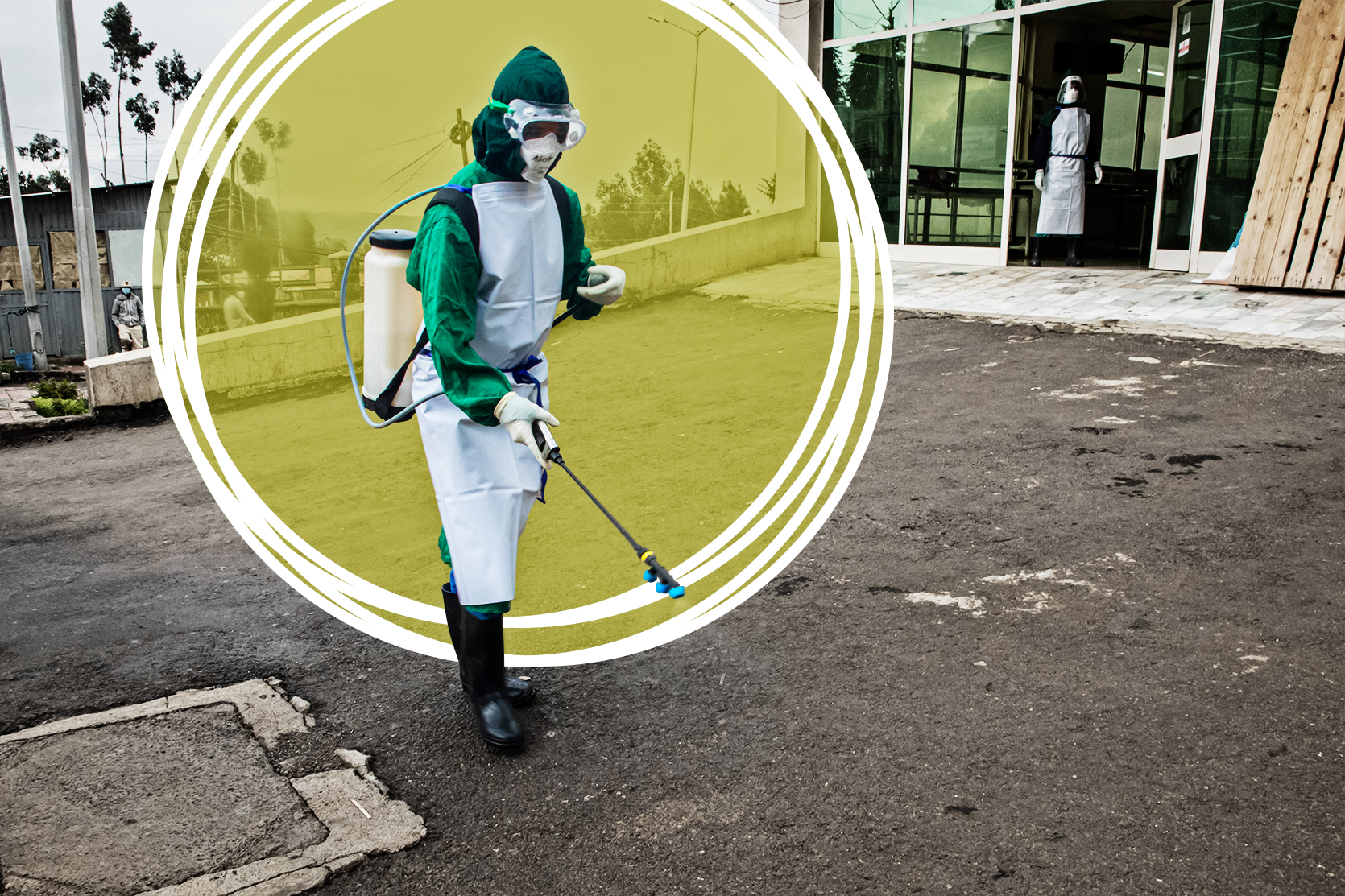
Burial rituals are an elaborate affair in most of Ethiopia. Burials here have their roots in the Jewish culture of “Shiva”, and they are followed by a period of mourning in which an entire community is engaged as a show of solidarity with those who are grieving. For three days after burial, large tents are erected for people to gather under to talk, eat, drink, and often play cards. The whole process is seen as an important way of helping the family members of the deceased to overcome their grief.
Attending a “sitting shiva” is therefore a requirement for everyone in a neighbourhood, a demonstration of social conformity. Not doing so is seen as disrespect for the family. Food, drinks and other items will be supplied by Idir, a type of traditional, financial self-help association or informal group life insurance. Idirs can be organised by a local community, a village, between colleagues at work, and even among friends and family. Members pay a minimal weekly or monthly contribution and in return receive support in times of emergency, including family deaths, according to a blog by Professor Ayele Bekene.
For three days after burial, large tents are erected for people to gather under to talk, eat, drink, and often play cards.
Among other things, Idirs supply the tents that are raised to host mourners at a “sitting shiva”. Until a few months ago, they were a common sight in the capital, Addis Ababa. Not lately though; fewer funeral tents are being raised, for fear that large congregations will contribute to a faster virus infection rate. Indeed, the number of burials in the capital has visibly declined during the past few months. Businesses selling burial vaults complain that their sales have dropped by more than half since the onset of the virus.
“Considering the prevailing situation, we respectfully inform you that we won’t sit for mourning and that we are unable to receive condolences,” said a banner put on the gate of a residence in Addis Ababa, in May this year (see below photograph).

Yet the caution is somewhat surprising, considering that the government has eased its earlier restriction on funerals by allowing families to conduct burials – formally, at least, without the participation of their wider community. Clearly enforcement was impractical – and also difficult, considering the social importance of burial ceremonies. Now, no more than 50 people are allowed at funerals.
This is in a moderation of an earlier regulation that followed up the state of emergency, which would have seen all Covid-19-related funerals carried out by the state, at designated places. Other regulations stipulated the mandatory wearing of masks, limited diners at restaurants to three seats at a table, banned drivers from transporting more than two people and required public transport vehicles to not carry more than half their capacity.
If the earlier restriction on funerals had been in place, it might have protected 44 people who contracted the virus while attending a burial three weeks ago in Dukem, a small town 36km east of Addis Ababa. The deceased person had died of a car accident, but had tested positive post-mortem, according to Dereje Abdena, deputy head of the health bureau for the Oromia Regional State. Those infected at the funeral included members of the immediate family, neighbours and others from the wider community.
If the earlier restriction on funerals had been in place, it might have protected 44 people who contracted the virus while attending a burial three weeks ago in Dukem.
Health authorities have recorded transmissions from burial events and mourning sites in three counties located in different parts of the country. These have occurred as part of an alarming growth in the rate of infection of the Coronavirus in Ethiopia. First discovered in March 2020, the virus had shown a rapid rise in the number of infections by the time of writing (the last week of July 2020). The last week of July saw 4,738 new infections, a staggering increase of 260% compared to the numbers a month earlier.
The highest daily infection rate so far, 805, was recorded on July 30. A little over a week later, there were 16,615 positive cases, of the 413,397 people tested, still representing a minute fraction of the population of over 110 million. That is 3,505 people contracting the virus for every million citizens. Although recovery rate is high and infection rate remains below 10%, the highest daily death rate was reported on 29 July, after 14 people were lost due to COVID-19.
So far, the country’s Coronavirus-related death toll is less than 300, with close to 40% of those who test positive recovering. At the time of writing, some 6,685 people have recovered from the virus since March, while active cases are 8,870, according to official figures. The death rate in particular is, however, subject to revision. In some cases, people who have died of other causes have also turned out be Covid-19-positive – as for instance, at Dukem.
At the time of writing, some 6,685 people have recovered from the virus since March, while active cases are 8,870, according to official figures.
Dukem was not an isolated case. One day after her ministry reported the highest daily infection rate, and more than a week before the highest daily death rate as recorded, Ethiopia’s health minister, Liya Tadesse warned the public of tough times ahead. “Once again, I urge everyone to follow the simple guidelines CONSISTENTLY to protect yourself, your family and community,” she tweeted.
In daily life, wearing face masks has become ordinary and regular, with supermarkets and groceries refusing to admit those without. Major hotels do not accept guests without first checking their temperature, and no more than three guests are allowed to sit at a table. At the Sheraton Addis, the largest and most luxurious hotel in the country, guests are pressed to spend more than 500 Birr ($11) at a time; this appears to be an attempt to compensate for the losses of revenues caused by allowing few people in.

Most public office and financial establishments provide water and liquid soap at their entrances. Hospitals and health centres are under instruction to check whether new patients might have the Coronavirus.
But the prevalence of these preventive measures is in sharp contrast to a lack of behavioural change among people who frequent the Addis night scene. Another government regulation requires hospitality establishments to close after 8:00pm, but most bars in the capital remain open, and the busy social scene gives the impression that the revellers somehow regard these places as “Corona-free zones.” Physical distancing has little relevance, and few face masks are worn.
But the prevalence of these preventive measures is in sharp contrast to a lack of behavioural change among people who frequent the Addis night scene.
Although many of these establishments make water and liquid soaps available at the entrance, they are hardly utilised. Some nightclubs stay open way past midnight, with those wanting to enter being carefully vetted by the bouncers. Clearly, the owners of these establishments are negotiating with some members of law enforcement.
The current low mortality rate may be deceptive, given the rising rate of infections. The numbers of people still attending funerals and nightlife activities suggest that some are getting complacent about the threat of the virus. Other citizens, meanwhile, are deeply concerned. Henok Solomon, tweeting as @HenokSol, commented on the minister’s message urging caution by saying that “strong measures must be taken by the government to avert the looming catastrophe.”
Indeed, there is no sign that the curve is flattening in Ethiopia. The health minister will need to devise and implement more effective measures than the use of uppercase in her tweets if she is to persuade people to consistently adopt appropriate measures against the virus.
We’d love to hear from you! Join The Wicked Conversation by leaving your comments below, or send your letter to the editor to richard@gga.org.
Tamrat G Giorgis is the managing editor of Fortune, which covers mainly the economies of Ethiopia and Africa. He has over 28 years experience in nearly every aspect of publishing with more than 11 various publications. He is a member of the Alumni of the University of Georgetown’s School of Foreign Policy and regularly contributes to specialised international publications.








